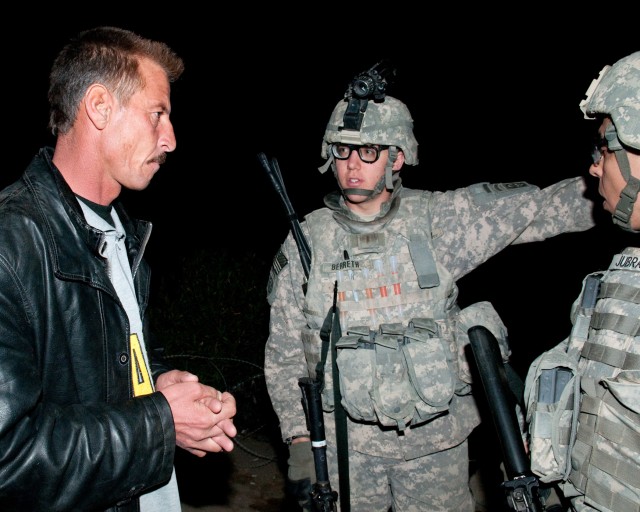
CAMP RAMADI, Iraq (March 30, 2010) -- There is a tendency here in Iraq to cast any story in its shadow, to find meaning in not what is but from what was.
Recasting the peace among Anbaris during the recent national election in such terms, we might recall how, only two years ago, a U.S. military official declared Al Anbar province lost. What a difference.
In more clinical terms, the 50 attacks during September 2009 are astounding weighed against the 1,350 in March of 2007.
However, the constant breathing of life into the past can give it legs of its own: continuing a well-worn narrative, a journalist declares that "a series of blasts shattered the peace in the months leading up to the election," as if the past is the rightful heir to the future, as though a marketing campaign by a handful of terrorists is enough to negate the efforts of a 100,000 boots on the ground and the hopes and determination of millions of Iraqi citizens grown tired of anguish and turmoil.
Sometimes, as 2nd Lt. Andrew Berreth discovered during a recent visit to an Iraqi police checkpoint, it's the subtle shifts, the casual comments, what fringe has grown from the new fabric of Iraqi life that let on where they are as a people and a nation. Just as cattails growing along a water's margin best describe a relative tranquility - the germination of a new way can be both subtle and dramatic.
Berreth is a platoon leader of a route-clearance team: 3rd platoon, Company A, Special Troops Battalion, 1st Brigade, 82nd Airborne Division (Advise and Assist). His platoon hunts for roadside bombs. The brigade is of a special type, one developed specifically to partner with Iraqi police and army to harden and sharpen their skills.
Two other engineering platoons in his company are partnered with Iraqi army troops to teach them the latest in route-clearing techniques and tactics - one with 7th Iraqi Army Division in Al Asad, the other with 1st Division in Fallujah. Berreth's team, however, is not partnered, but rather, provides a foundational service - keeping the main supply routes clear and safe for the brigade's other activities to continue. In seven months, 1/82 AAB has taken no casualties to improvised explosive devices.
"We aren't finding much lately," says Berreth. "We'll stop and talk with IP to gather intelligence, find out what they need, and figure out what we can do to assist them. Our advise-and-assist role is to gauge the workability of the traffic control points and to see if they can be improved upon."
Since November, the platoon has found three IEDs, none causing injury.
"We see plenty of dead donkeys along the road," said Pfc. Chad Turner.
"And that monkey," added Pfc. Zachary McCoy.
"We swear we've seen a monkey twice," laughed Turner. "The most remarkable thing we've seen is in the improved construction of IP check points."
Outside Ramadi, the IED hunters stopped at an Iraqi police check point to visit with the police. Berreth dismounts his MRAP as does Jorgensen and a handful of others.
Along this stretch of road, there is little noise beside the banter of policemen and U.S. troops. Semi-feral dogs wander in the periphery of light cast by the station's floodlights.
First Lt. Haithem, the officer in charge of the dozen policemen, gathered to chat with the Americans. He reported that the situation is very stable and safe.
"We can walk outside anytime, daylight or dark, and as you can see, everything is safe," he said.
Haithem has been stationed here for 2.5 years. He says his men have learned much from the Americans, techniques such as searching and how to approach dangerous targets. Skills that keep his men alive.
But as much as his men enjoy visiting with the Americans, it is good that they are leaving, he said. "If you stay here, I am going to depend on you. I am going to do nothing."
Berreth asked the silver-haired police officer whether all his men voted in the recent national elections.
"All of my men, without exception," he replied.
"Congratulations on a successful vote."
"We hope," Haithem said wistfully, "We hope everything is okay after the election results are announced."
And casually, as if he were talking to a neighbor, the Iraqi said, "We congratulate you on the healthcare plan in America."
Mildly shocked, Berreth was taken aback.
"You track our news'" he asked.
"Yes we do," responded Ali, another policeman.
"We saw President Obama, and he was so excited and happy."
And, tempted to engage the Iraqis on the healthcare debate, the American paratroopers realized the subtle and astonishing change that had occurred, said Berreth.
Saddam had kept his subjects blinded to the world by prohibiting Internet and cell phones; insurgent and terrorist violence had kept them too afraid and too busy to care. With peace and stability and the tools of a modern, free society on the table before them, Iraqis are picking them up and becoming world citizens.
They know what's going on.
"You could stay here five years more, maybe 10," says Haithem, "but then we will do nothing. You have taught us very well, and as you see, all the police are doing their jobs. It is very peaceful now."
(Sgt. Michael J. MacLeod writes for the 1/82 AAB, USD-C)

Social Sharing